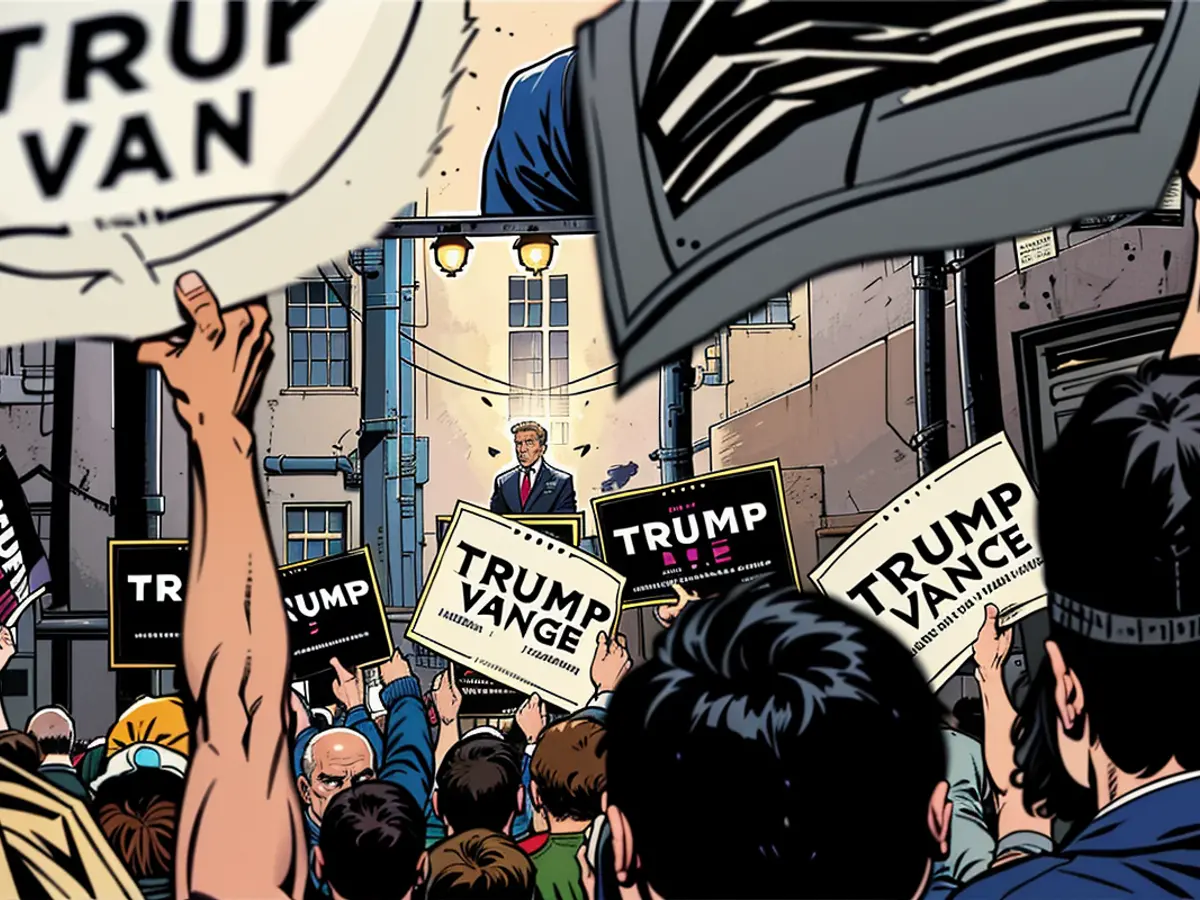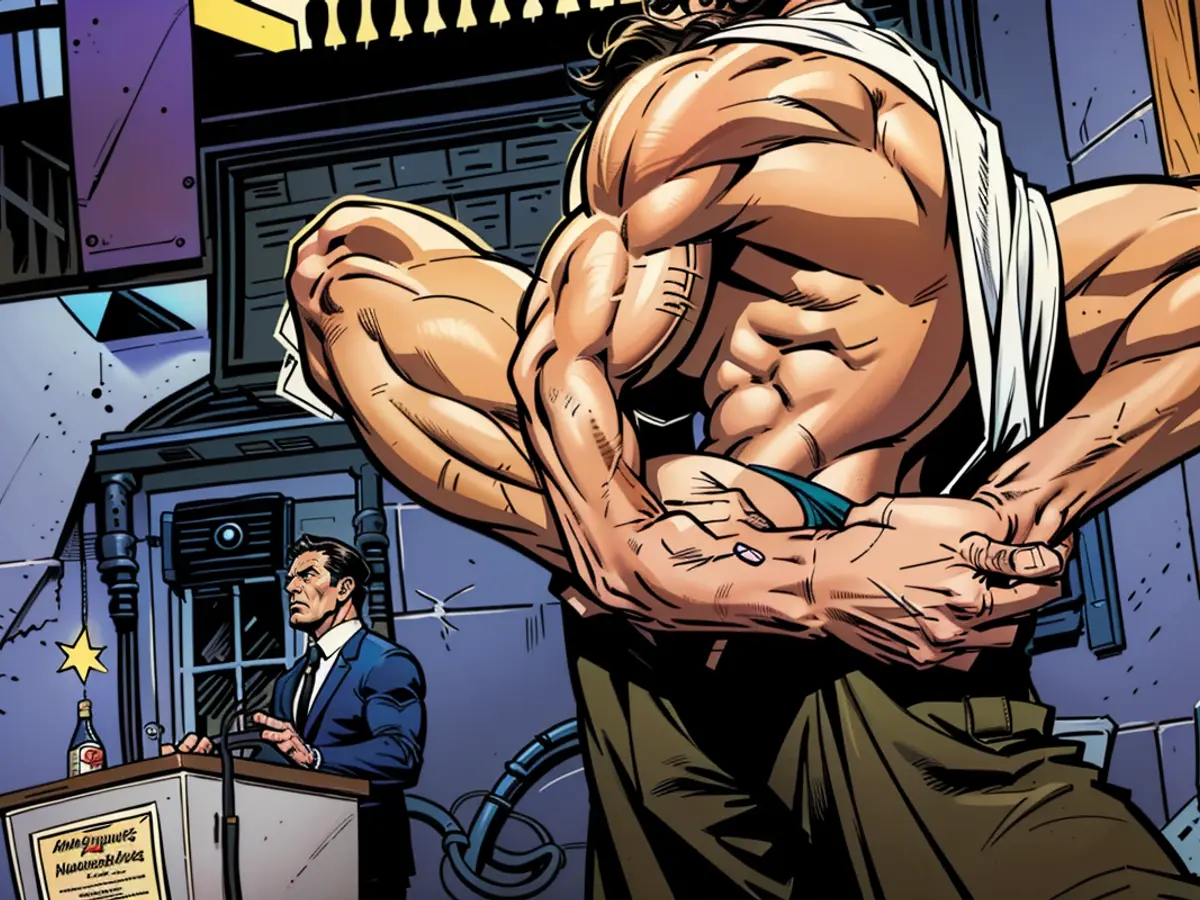Vance snorts and chuckles, Trump smiles benevolently
What role does J.D. Vance have in a possible US government of Donald Trump? During his first speech as Vice Presidential candidate, he presents himself as a tough fighter for the interests of American workers. He intends to convince them in the contested states.
The man who this evening introduces himself to the people of the country as Vice Presidential candidate of Donald Trump, surprises with an unexpected side. Does J.D. Vance adopt the over-the-top hardline speech of a young Republican Senator? No. Does he paint the fiery picture of a conservative government in the living rooms of the country in the event of a victory? Not really. Does he fan the flames of the party with extreme positions? False alarm. Or does he engage in the culture war? Not at all.
Instead, J.D. Vance presents himself as a softer, more relatable rising star; a man who has anecdotes to tell, a family man. He claims to have suffered with other working-class families under all the wrong decisions made by US President Joe Biden during his time as Senator, and from that he has drawn conclusions. And he sees Trump as the man who should lead the US as President into the future. With him as Vice President, fighting for the "forgotten workers." Trump smiles approvingly at him from a distance, sometimes even rising for a standing ovation.
Trump, his family, and a few Congress members have been sitting on the dais longer than Vance, who comes onto the stage. The White House is already very close behind him on the large monitor. That Vance is there is a story of upward mobility, as often told in the USA. After a difficult childhood and youth, he joined the Marines, served with them in the Iraq War, and then studied law on a scholarship at an elite university. In 2016, he published his autobiographical book "Hillbilly Elegy" and it became a bestseller, making him a sought-after commentator in the media.
He described Trump's promises at the time as "cultural heroin" a few months before Trump's election victory in 2016, explaining to a shocked society why workers had voted for Trump. He criticized him sharply. Four years later, shortly after Trump left the White House, Vance met him for the first time in Mar-a-Lago and apologized, and after hours of conversation, made peace with him. And in 2022, he wins the Senate seat in Ohio as a candidate without ever having held a political office before.
Signal to NATO
In Milwaukee, the attendees listen and watch as Vance, after the emotional introduction and anecdotes, gets to the heart of his matter: The financial industry of Wall Street drove the country into decline on the backs of workers, destroyed jobs, and the Democrats flooded the labor market with "millions of illegal immigrants." The inflation crisis, he says, is a crisis of affordability. "And many of the people I grew up with can't afford more for food, more for gasoline, and more for rent." Exactly that was given to them by Biden's economy.
Instead of campaign signs with only Trump's name, there are now those with Vance's. "Peace through Strength" is on some, "Trump will end the Ukraine War," or also "Mass Deportations Now." They are held high during Vance's speech.
The future will be different with Trump and his administration, Vance states: "We are done catering to Wall Street and we will commit to the worker," he promises. "We are done importing foreign labor, we will fight for American citizens. We are done buying energy from countries that hate us. We will get it directly from American workers in Pennsylvania and Ohio." And: "We will protect the wages of workers and prevent the Chinese Communist Party from building their middle class on the backs of our workers."
This is simple, understandable, and the hall cheers. Not only towards China and the US trading partners, but also towards NATO, he sends a signal: "We will ensure that our allies share the burden of maintaining world peace. No more free rides for nations that exploit the generosity of the American taxpayer."
"Hardliner compared to what?"
Vance has turned his family history and background into political capital. He is to lead Trump's campaign in those states that are particularly contested and where people have felt disadvantaged by globalization for years. He is to serve as a bridge for younger voters. In his book, he described bitter nostalgia for the industrial decline of these states and the social consequences in a vivid way. Wisconsin, Michigan, Pennsylvania, states in the "Rust Belt" in the northeastern USA, these are the decisive battlefields. If Trump and Vance win there in November, the Democrats have little chance of remaining in power for another four years.
Vance brings a lot of youthfulness, determination, and will be great, shows Delegate Salleigh Grubbs convinced. He sounds like a hardliner, "but a hardliner compared to what?", she asks. Another delegate tells of being "speechless, somehow shocked" when he learned of Vance's vice presidency: "He will attract conservative-leaning Democrats, Independents, and Generation Z." It's a great election.
Vance makes a final oath: "Every single day in the next four years, when I enter the White House to help President Trump, I will do it for you or your family, for your future, and for this great country." The band plays again, the delegates wave signs and cowboy hats, some are already leaving the room. The big finale with Trump still follows on Thursday evening.
In the context of the 2024 United States Presidential Election, J.D. Vance, a prominent figure in Trump's campaign, draws parallels to his past, stating, "In 2016, I criticized Trump severely, calling his promises 'cultural heroin.' But I met him, we had hours of conversations, and I made peace with him."
During his speech in Milwaukee, Vance takes a strong stance against globalization and its impacts on American workers. He voices his intention for the 2024 US Presidential Election, saying, "We are done catering to Wall Street... We are done buying energy from countries that hate us. We will protect the wages of workers and prevent the Chinese Communist Party from building their middle class on the backs of our workers."









